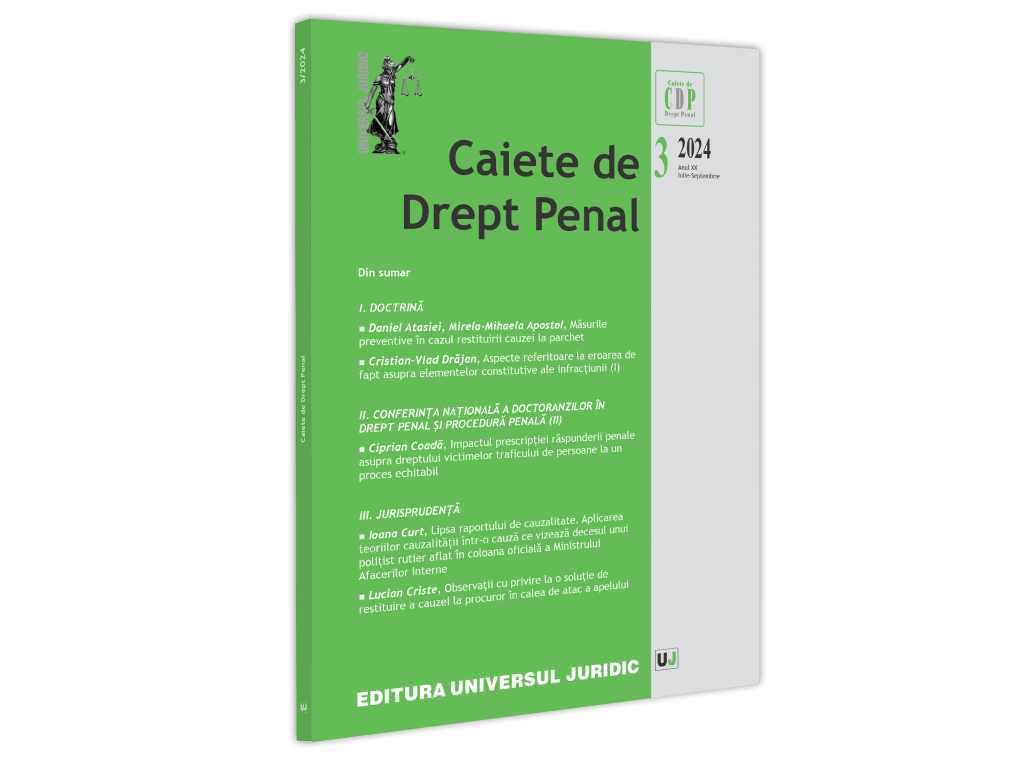Impactul prescripţiei răspunderii penale asupra dreptului victimelor traficului de persoane la un proces echitabil
DOI:
https://doi.org/10.24193/CDP.2024.3.3Cuvinte cheie:
prescripția răspunderii penale, traficul de ființe umane, protecția victimelor, acțiunea penală și acțiunea civilă în procesul penal, obligații pozitive din partea statelor, Convenția Europeană a Drepturilor Omului și jurisprudența CEDO, dreptul la un proces echitabilRezumat
Lipsa de inițiativă a legiuitorului, care a omis să intervină asupra unor dispoziții cu un rol deosebit de important asupra instituției prescripției răspunderii penale și modificările nu atât de inspirate aduse altor dispoziții ale Codului penal, referitoare la termenul de prescripție a răspunderii penale, cu privire la unele infracțiuni de trafic și exploatare a victimelor vulnerabile, ar putea fi privite ca evenimente legislative cu un profund impact asupra dreptului persoanelor vătămate la un proces echitabil.
Aceste evenimente pot produce efecte atât în plan penal, prin obstacularea eforturilor de aplicare a unor sancțiuni eficiente, proporționale și disuasive față de autorii infracțiunilor, cât și pe plan civil, ca urmare a dificultăților de probațiune generate de trecerea timpului.
Deși în viziunea Curții Europene a Drepturilor Omului obligația de anchetă efectivă nu implică în mod necesar pedepsirea celor vinovați de comiterea infracțiunilor, în cazul unor fapte grave conduita autorităților naționale poate contribui la reducerea standardelor de protecție a victimelor. Un astfel de comportament din partea autorităților de elaborare și aplicare a legii poate intra în conflict cu standardele de protecție consacrate de art. 4, art. 6 sau alte dispoziții ale Convenției, întrucât compromite obligația statului de a investiga și sancționa infracțiunile de trafic de persoane reprimate prin instrumentele de drept internațional.
Neîndeplinirea acestei obligații pozitive din partea statului și implicațiile unei politici legislative deficitare își pot pune amprenta nu doar asupra modului în care drepturile garantate victimelor sunt respectate, ci și asupra securității colective pe care orice sistem judiciar este ținut să o protejeze. Această concluzie este întărită tot mai mult de faptul că infracțiunea nu mai este privită ca o simplă încălcare a legii, ci ca un prejudiciu adus persoanelor și comunității, astfel încât abaterea de la obligația de anchetă, în cazul faptelor grave, reprezintă un eșec major al politicii penale a statului și un semnal injust pentru victimele infracțiunii, ale căror speranțe legitime depind în cea mai mare măsură de modalitatea de înfăptuire a justiției penale.
Articolul de față aduce în atenția teoreticienilor și practicienilor dreptului importanța obligației de legiferare din partea statului și a celei de investigare a infracțiunilor de trafic și exploatare a persoanelor vulnerabile, într-o etapă istorică în care obstacularea justiției devine destul de vizibilă.
Pasivitatea unor autorități de elaborare și aplicare a legii ridică numeroase rezerve cu privire la efectivitatea drepturilor și protecției victimelor traficului de persoane, întrucât cel puțin 2,4 milioane de oameni sunt traficate în orice moment în întreaga lume, în timp ce doar câteva mii de traficanți sunt condamnați anual.
În Europa, acest risc de inactivitate, remarcat prin diferitele hotărâri de condamnare ale Curții Europene a Drepturilor Omului, pare a fi alimentat și de lipsa unor măsuri operaționale adecvate, dar și de lipsa de determinare în combaterea și investigarea fenomenului din partea statelor gazdă, a celor de tranzit sau a celor unde recrutarea victimelor se realizează.
Ca orice alt proces de cercetare și interpretare a dreptului, demersul nostru poate genera controverse, motiv pentru care nu intenționăm ca prin intermediul acest articol să exprimăm un verdict, ci să îndemnăm la reflecție, într-o perioadă ce se arată nefastă pentru standardele de protecție a victimelor infracțiunii.
Acest demers se adaugă și altor semnale ce atrag atenția atât asupra eșecului statelor de a le proteja în mod eficient pe victimele criminalității, cât și asupra „nedreptăților legale” cu care victima se poate confrunta, ca urmare a unor soluții întemeiate pe împlinirea termenului de prescripție sau pe alte incidente ce împiedică angajarea răspunderii penale a făptuitorilor.
Încă de la început facem precizarea că, deși titlul acestei lucrări sugerează că prescripția răspunderii penale s-ar putea răsfrânge asupra dreptului victimei traficului de persoane la un proces echitabil, exprimarea noastră urmărește doar simplificarea mesajului transmis cititorilor.
De aceea, trimiterea pe care o facem cu privire la dreptul victimei la un proces echitabil nu are în vedere dreptul protejat în mod special de art. 6 din Convenție, ci echitatea în ansamblu a procedurii, care poate fi afectată și în ipoteza încălcării altor drepturi garantate victimelor, prin nesocotirea termenului rezonabil de soluționare a cauzei și deficiențele de anchetă sesizate în sarcina autorităților statului.

